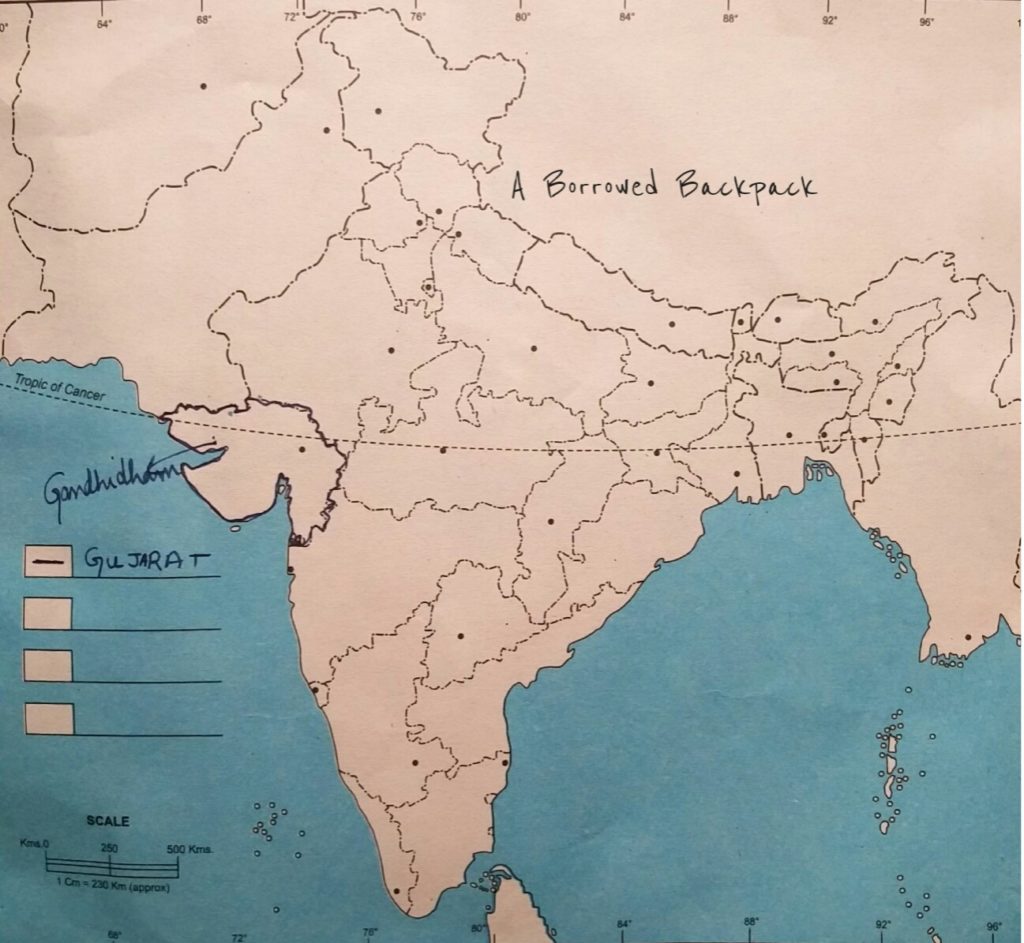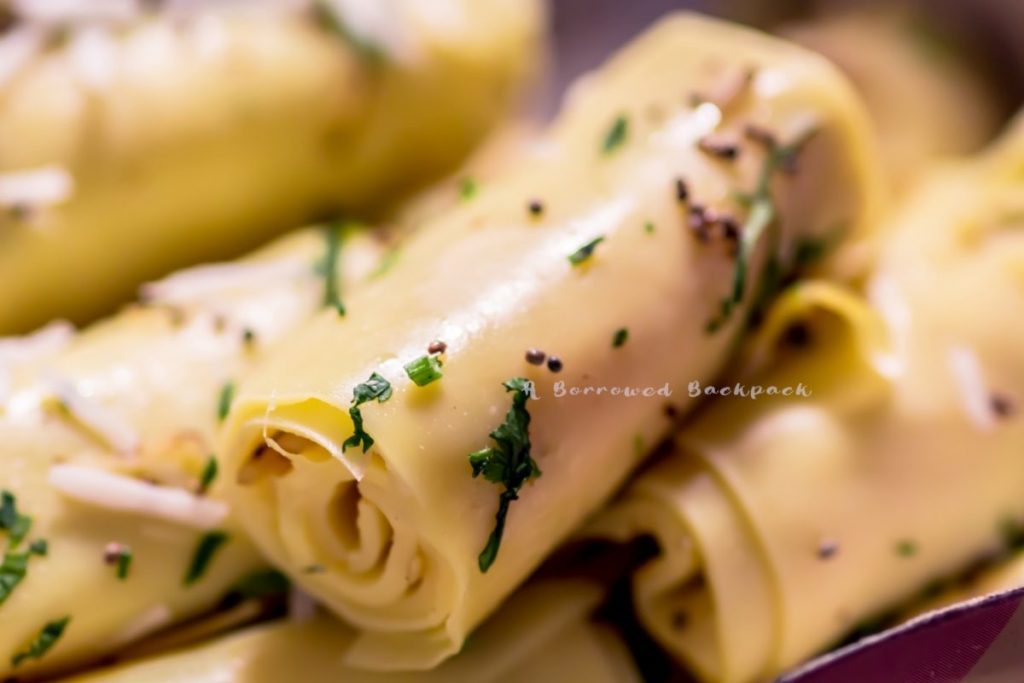Years ago, my father got transferred to Gandhidham for one of his postings. Back then, we were settled in a remote town in Chattisgarh, and vaguely knew that the said place happened to be in Gujarat. To put things into perspective, here is a map explaining the location of the state, with respect to the Indian map.
The area marked in blue ink is the state called ‘Gujarat’, and the dot-mark is placed at approximately what should be ‘Gandhidham’.

Gujarat, the land of sweet food.
My father, a diabetic for last 25 years.
But as they say, the show must go on.
We moved to Kutch, and during winter-breaks, a newer place became ‘home’ to come back to.
In the process of settling down, we sent out a word that we were in need of a part time domestic help. Soon the word got around, and out of several women who came looking for work, we hired one.
She was to cook for us twice a day. My father’s only instruction to her after the first meal from her was, “do NOT put sugar in anything from the main course”. She nodded her head in affirmation every time she was told this. Things would go fine for a couple of meals, before becoming an all-encompassing, palatably confusing, ‘sweet deal’; sweet kadhi, sweet ‘daal’ and/or sweet vegetables‘.
After this, came the question that most of the other states wonder about Gujarat; why is Gujarati food sweet, or why do Gujarati add sugar to their food?

I have taken after my father, and I dislike most of the sweet food.
‘Home’ is rarely a place; it is a feeling, few people and some specific kind of food. By the end of my first week of being back from college, I had ruefully eaten several combinations of sweet main-course; spicy-sweet, tangy-sweet, chilly-sweet, sour-sweet, sweet-sweet, salty-sweet. You name it, and I had had it. Half of the experience of returning home during college -break was ruined just because of this, leaving me horrified, meal-after-meal. Our protests fell on deaf ears, and sugar continued to be an integral part of our lunches and dinners.
One afternoon, I cornered the cook and got talking, to understand what was so tough for her to comprehend and follow.
“It is difficult for me to not put sugar or jaggery.”
“Why?”
“Madam, it is ‘automatic’; like you would put salt.”
I dug deeper to grasp the root cause of the ‘problem’.
“We Gujarati(s) put sugar in our food to nullify the effect of ‘khaara paani’ (salty water) that the region has. This part of the country is largely a dry, coastal desert.” said our neighbor. ‘Coastal’ and ‘desert’ in one sentence was new for me. “But not all things are sweet. Thepla, fafda, dal-wada, khichu, sev-khamani, sev-tamatar are not sweet and can be had by a diabetic”, she explained further.
Since the region has limited cultivation of green vegetable (while Gujarat is largely a vegetarian state), most of the dishes find extensive use of gram-flour (dhokla, wada, pakoda, khamman, khandvi), dairy product (kadhi, chaach, doodhpak to name a few). Many of these items can last for several days.
As it happens with people, food and places, we fall in love inspite of them; we grew to like ‘kutchi’-cuisine. Gradually, our evening-walks turned into a reason to go for ‘dabeli’, kutchi version of ‘pao-bhaji’, a kind of ‘jhaal-moori’, but never dhokla. Unlike other states, ‘dhokla’ is strictly a breakfast item in the state.
The other theory that came my way was- the combination of salt and sugar helps in keeping one hydrated in the hot climate of Gujarat. How much of this is true, remains to be verified. That said, inspite of our resistance, Gujarati food grew on us and how. So much so, that I would happily book few cheap tickets to some of these ‘foodie’s paradise’ states, as soon as Indigo or Jet Airways announce their next flight-ticket sale!
P.S.: If you are a diabetic, and are looking for non-sweet items, here is the list of food-items that do not contain sugar: Thepla, fafda, dal-wada, khichu, sev-khamani, sev-tamatar, some daal(s).

That is such a fun fact! I find that I pick up my seasoning habit from those who have taught me how to cook. I never considered it would have been a way to counteract an issue such as salty water!
Hey Carmy,
Who knew!? 😀 Born and brought up here in India, I got to know of this only when we moved to Gujarat.
Thank you for stopping by.
I have spent 10 years of my life in Gujarat and I so love Gujarati cuisine! Dhokla all time favourite!
Hi Vaisakhi!
I used to love dhokla at one point in time, and then I discovered Khandvi.
😀
An interesting read. I never knew about the reason why the Gujarati food is sweet. We in the south love spicy food and Gujarati food tastes good when had occasionally due to its sweetness, but still, some of the Gujarati dishes like Dhokla, Thepla, fafda, are all time favorites
Yes Rashmi, I agree with you.
I can’t have sweet food everyday, but some dishes are classic.
😀
Interesting perspective. As someone who grew up in Gujarat i find your logic agreeable, and yes, Gujarati cuisine grows on you very fast. Having lived in MP and travelled to most states you value the spread once you see limited menus in most states. You write well. By the way “khara-pani” is history as the state has been getting Narmada water for over a decade now. The food though, still remains sweet.
Hi Shyam,
Thank you!
Well, culture doesn’t change like the source of water, and that adds diversity in the platter.
😀
This is fascinating that sugar is used to counteract the salty water. I have quite the sweet tooth although it doesn’t help that I eat too much processed food, which contains a lot of sugar.
Hey Marteen,
Processed food is altogether a different story. It helps in nothing, and is a problem in long term.
Thank you for stopping by!
How interesting! I love sweeter food, and do not enjoy saltiness. It is too bad that the water is overly salty in the region, but sweet food can be quite satisfying.
Hey Janine,
I agree with you that for people who like sweet food, it can be quite satisfying in a good way!
To have it everyday is a different story altogether though!
Thank you for stopping by.
🙂
i remember a few friends who also told me that even they are diabetic, they still enjoy sweets because they always think that there is no sweets in heaven so better enjoy the sweet-life, lol
Hey Blair!
Thats a funny logic there! 😀
This is interesting logic behind the sweetness! I would personally love it, I have a major sweet tooth!
Hey Shane,
Good for you, because I can’t have sweet food everyday! It is very difficult for me.
Hope you get to try out Gujarati food soon.
🙂
Okay I get that now… salt water and sugar connection, but I am yet to figure out why Bong food is sweet? 🙂
Hey Indrani,
I asked the same question to my friends on FB, but turns out that Bong food has mostly sweet-dishes which are sweet, and nothing from the main course, or snacks. Former is mostly dairy based in Bong food.
So that’s that.
Thank you for stopping by.
I have never heard before that India can have sweet food too. From my own experience (but I never visited Gujarat), every meal I had in India was very spicy. I would like to visit Gujarat though just to try out the food. Sounds intriguing!
Hey Joanna
The whole idea behind A Borrowed Backpack is about shattering stereotypes. Who would associate India with cleanliness? But then, it has the cleanest village in Asia too. Here, in case you wish to read:
https://aborrowedbackpack.com/2015/12/03/mawlynnong-mystery-behind-cleanest-village-in-asia/
Do try out Gujarati food. It is amazing!
Thank you for stopping by.
🙂
I have always wondered why it is so sweet, and now I have the answer! 🙂 I love gujarati food, and miss it very much (I don’t get very good gujarati food here in Washington, USA).
Hey Anju!
I understand that problem of not getting your favourite food away from homeland.
Thank you for stopping by.
🙂
I love sweet food. And the reason why this food is sweet amazes me. I’ve tried some Indian cuisines and sweets, but I’ve never crossed one like this.
Hi Synz,
Thank you for stopping by.
🙂
I thoroughly enjoyed reading it, Divya. It reads like a short food/culture essay. Quite an interesting read. Coming from an archipelagic country, the Philippines, our food is either too salty or too sweet. Thank you for this!
How interesting and fascinating. I never thought about it that way… the way the people in this region put sugar into their food is like we put salt into our food. This is a great way to understand the area and culture better! I am like you and your Father, I am not a fan of sweet food, so I am not sure how I would go with a sweet dhal!
Hey Soyara,
to be fair to them, they do put salt too, in case it didn’t come through in my post.
Thank you for stopping by.
🙂
Have you tried Gujarati dal of wedding ? They put clove pieces in it and it perfectly balances salty, spicy, soury and sweet tastes in Gujarati Dal. In everyday home cuisine dal, clove is not put due to it’s hotter properties.
Hi Het,
I have had Gujarati Dal. Our kitchen help in Bhuj started making it when we requested her to make something less sweet. Even though we don’t live in Gujrat any longer, we still have that dal from time to time, but minus the sugar.
Thank you for the recommendation! I am sure it will help other readers too.
Such an interesting explanation about the water and hydration. I am not a fan of very sweet dishes but love trying out new food.Thanks for the list of sugar free foods.
Hey Verushka,
Yes, it was interesting for me too.
Thank you for stopping by.
🙂
I love Gujarati food! I’m not a big fan of sugar in my food but Gujarati cuisine just nails in perfectly.
Hey Vedante,
Even I am not a fan of sugar in my food.
Thank you for stopping by.
🙂
Being a Gujarati myself, I can say that not all Gujarati food has sugar 😀 . But yes, the reasoning is right. The well water or hard water in the state does merit a bit of sugar. And well, what is life without a little salt and sugar in it 😀
Thank you, Ami!
😀